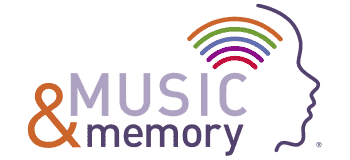
In thousands of MUSIC & MEMORY® Certified Care Organizations, we’ve witnessed time and again how musical favorites can help people with Alzheimer’s and other dementias reconnect with the world. Now, a team of researchers at the University of Utah Health in Salt Lake City have demonstrated the brain chemistry underlying that remarkable reawakening.
A study published in the April online issue of The Journal of Prevention of Alzheimer’s Disease reports how the U of U Health team found preliminary evidence that familiar music may facilitate attention, reward and motivation, which in turn makes it more possible to manage emotional distress in Alzheimer’s.
As Alzheimer’s progresses, language and memory centers in the brain are the most vulnerable to damage. However, certain brain networks remain relatively functional—in particular, those areas responsible for attention, known as the salience network. This is the same part of the brain that registers the thrill of listening to favorite music in a person who is cognitively healthy.
So researchers wondered: Would musical favorites “light up” the salience network of someone with Alzheimer’s during an MRI brain scan? To find out, they recruited 17 participants with dementia to undergo MRIs as they listened to 20-second clips of music from their personalized playlists. For each participant, researchers played eight music clips, the same eight clips played in reverse, and eight blocks of silence.
Musical Favorites Stimulate Several Areas of the Brain
MRI image comparisons indicated that musical favorites stimulate several areas of the brain: not only the salience network, but also visual, executive and cerebellar networks. All showed significantly higher functional connectivity with music versus silence.
According to Norman Foster, M.D., Director of the Center for Alzheimer’s Care at U of U Health and senior author of the study, the research provides “objective evidence from brain imaging that shows personally meaningful music is an alternative route for communicating with patients who have Alzheimer’s disease.”
While the study’s small sample size and single imaging sessions leave room for more research to be done, the findings mark a significant step toward demonstrating how Music & Memory’s personalized music program is a therapeutic mechanism to address measurable improvement in mood, awareness and quality of life for people with dementia.
“This is an exciting development as we watch researchers in the U.S. and around the world continue to ground our work in evidence-based science,” says Dan Cohen, Music & Memory founder and Executive Director. “Personally meaningful music should be considered as a standard of care for all people with dementia.”
Founded in 2010, MUSIC & MEMORY® is a non-profit organization that brings personalized music into the lives of people with cognitive or physical conditions through digital music technology, vastly improving quality of life.
Image Credit: Courtesy of Mass General Hospital and Draper Labs
